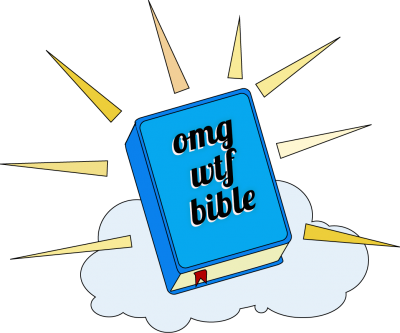Ever read the Bible cover to cover? Think it’s a bit strange so much of our society is built by a book most people never read in its entirety? Listen to one little podcast, and your relationship to this all-pervasive text may change radically. Enter OMGWTFBIBLE.

Each month on this monthly podcast, a guest reads a chapter of the Bible while New York comedian David Tuchman — a former Yeshiva boy turned agnostic — swears, jibes, and elucidates. His line by line explication drops quirky facts and sarcastic commentary. The result is often offensive, consistently hilarious, and surprisingly enlightening.
Tuchman’s goal is two-fold: to entertain, and to educate, about this often ridiculous book. His commentary — a short-circuit of language similar to poetry replete with “fuck!” — grasps at what may be the original impression of the text. In Semitic cultures, a name revealed the essence of a thing: its meaning, its purpose, its ultimate significance to the namer. Tuchman’s episodes sort through centuries-old mistranslations to return the multilayered essence to the words. This is a challenge which Tuchman describes as “playing a three-millennia-old game of telephone.” His translations are raw and well-researched, drawing upon eighteen years of life in Modern Orthodoxy.
Tuchman grew up in Queens in an Orthodox community which believed their take on Judaism was the most correct. He served as the Baal Koreh, reading the Torah aloud to his congregation (a job very similar to the one he enjoys today.) He began having doubts of faith, however, in high school. Upon graduation, he flew to Israel to study in a Yeshiva. After three months, he left disillusioned and lived on his own off of Ben Yehuda in Jerusalem.
Years after the separation, he began to miss being a Baal Koreh. In my recent interview with Tuchman he admitted, “Every once in a while when I was drunk I would take out the Torah and say, ‘Listen to this, this is crazy!’ But nobody had any interest in it. Then I started performing stand-up comedy, something I had always been interested in pursuing.” We discussed our personal connection to the Bible a little more. For me, the Bible always possessed a kind of magic, a fairy-tale quality, and I was curious whether Tuchman used to feel the same.
“The Bible occupies a similar space in my head as do things like Star Wars or comic books,” he told me. “It’s a part of the mythos of my childhood. Now I’m retelling all of the stories with a kind of fervor I have about pop culture characters.”
Earlier that week I had scanned through OMGWTFBIBLE’s blog, a great resource for those looking to poke fun at the Bible and also review the podcasts. Suddenly I found an old post that said:
Myths are dumb. Let’s destroy them.
I balked. I could get into the punny profanity of the podcasts, but this was transgressing a different boundary. I brought it up with Tuchman. Myths serve many purposes, I began. They reveal the origins of our culture and are linked to our sense of hope and order. They are the stories we tell ourselves, ad infinitum. Artists recreate them, writers reproduce them. We all remain true to the human story though its sensory details change from culture to culture. What is life without myth? Was Tuchman an optimist trying to shirk off “the way of the world” mentality or a resigned pessimist?
“I think the post was incomplete,” he said. “I would say now, ‘Myths are dumb. Let’s destroy them, and recreate new ones.’ I think myths are unwieldy if we allow them to occupy a place where they don’t belong to us. I’m doing this project in part to reclaim ownership of this book. I’ve said before that it’s my personal interpretation and translation. We have to own the myths we recreate. They can change at any moment. I think we get stuck in believing that the world is given to us as is. That doesn’t leave us with a lot of power. What if we took the perspective that the world is here and we can do what we want with it? All texts exist and belong to us. The Greek myths that don’t contain the same power as the Bible are just seen as stories and not the foundation of an entire society.”
I was reminded of when I visited Jerusalem’s Israel Museum and read about the influential writings attributed to King Solomon. Before my trip, I had studied ancient Egypt’s wisdom literature composed by various pharaohs. It dawned on me as I stared through glass boxes that we would never take pharaoh’s wisdom literature as the foundation of our society as we do the wisdom literature of just another ancient Near Eastern culture. Up until that point, I had still placed the Bible on a pedestal. A good part of my mind wanted it to remain that way. The beauty and magic was too much to lose.
“It can remain on that pedestal,” Tuchman assured me, “but we get to decide what it looks like as it sits there.”
Editor’s Note: an earlier version of this article incorrectly attributed the piece to A&C Editor John Propper. This was an error; Propper edited the piece, which was written however by Catie Damon. The misprint has been corrected.

